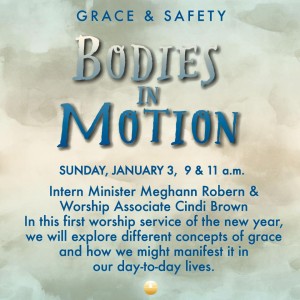

Listen to the sermon:
Bodies in Motion
I’ve been blessed to spend time this week with Suzanne and Arnie Reed, who were lifted up in our Joys & Concerns this morning. Since I’m new to this congregation, Arnie’s been telling me wonderful stories about how they came to this community, and about why he loves Suzanne so deeply. And the more he spoke, the more I felt like Suzanne’s life had a place in our services today. When I asked Arnie’s permission to share with you all today, he said, “Oh yes! People need to know about Suzanne’s generous heart, It’s what drew her to First UU Nashville, and changed the way I look at life. It’s the ‘pay it forward’ philosophy put into everyday practice.”
Now, I don’t want to get too much into the pay-it-forward aspect, because Jason and Valerie will be digging into that next Sunday. What Cindi and I wanted to offer up today was an exploration of the multitude of ways we humans experience grace, and how that affects our bodies and our actions as we move through the multiverse of our lives. There is no one universal definition, nor one “true” way to have it enter our lives. What ties all these different graces together is what we do as human beings once we have had such an experience, and we learn what that is through the stories we tell.
Our first story, “The Umbrella Sanctuary”, is the pay-it-forward good deed. It’s a concrete action that has an immediate effect, and continues to ripple outward. We don’t know why it rains, but we can offer you shelter. Sanctuary.
Our second story, about “Amazing Grace”, is the story of a paradigm shift in perspective, a dramatic turn that leads a man to question the very foundation of the culture and economy in which he exists, a foundation that provides food and shelter for himself and his family. He survives a great storm, a natural disaster, that forces him to confront his own mortality and the limited life span in which he has to offer anything to the world. When confronted with death, he chooses to focus on the known life before death, not a life after it.
For Arnie, angels aren’t cherubim or the heavenly host. They’re the people who show up when he needs them — the ones who pick up the mail and mow the lawn when he’s holding his wife’s hand in the hospital. He feels grace from his community showing up and doing the little things so he has more room in his life to care for his wife. And when he talks about Suzanne herself, he describes how she taught him to be a better person just by watching her interact with strangers on a daily basis. Everywhere they go, he says, she finds something kind to say to complete strangers — their server at a restaurant, the cashier at store. She goes out of her way not only to notice the people around her, but to make their day better if she can. In Arnie’s stories, over and over again, I hear how Suzanne lives out Unitarian Universalist principles by offering moments of grace, and now he tries to do the same thing because he’s been so moved by how she’s lived her life. Each person is worthwhile. Be kind in all you do. Help each other learn. Search for what is true.
And then there’s the grace we experience when getting to know each other, and when we’re learning the ways in which we think differently from each other even when we share values. My favourite story about this comes from my own family. One day, when they were first married, my grandmother, a Southerner, saved up and brought home a beautiful steak for her new husband, who was a Yankee. She took that steak, and she beat it, battered it, and deep fried it, because where she was from, that’s what you did with steak. My grandfather ate every bite of that meal, because he understood how much it had cost and how much thought and effort had gone into making it. And it was only after dinner that he offered up an alternative way to think about cooking steak. For them, compromise was never about sacrifice, but about showing the other person that they matter. That they are worthy of grace simply by being.
This story is one of many about my grandparents, and how they lived their life together as a series of infinite kindnesses, both to each other and to those around them. They offered grace into the world, through awareness and understanding. I don’t know how they received grace. I never thought to ask them before they passed, and that’s something I’ll regret. But I think that desire to know is a want from the seminary nerd in me. What I *need* to know, to work towards being in right relationship with those around me, is the effect they had in the world around them, regardless of its source. How they put their bodies in motion to manifest their values.
The worship theme for this month is Grace and Safety. I feel like it’s often when we are experiencing grace that we feel the most safe, and it’s through that sense of safety, of sanctuary, that we can bring more grace into the world. And, when we are willing to manifest grace, we draw others to us who are willing to do the same. Over a decade ago, the grace this community offered to people who identify as queer, by being a Welcoming Congregation, had the added effect of drawing people like Suzanne and Arnie, who wished to be allies, through your doors and giving them a spiritual home.
So, in the spirit of Cindi’s meditation, I’d like to offer up an alternative to the traditional New Year’s list of resolutions, because I think we tend to set ourselves up for disappoint and a sense of failure that way, which is the opposite of grace and safety. What I’d like to suggest instead is a list of New Year’s Possibilities. For me, it might read something like this:
What if I tried to greet my family in the morning *before* my coffee instead of waiting until after it? What would that demonstrate to my kids?
What if I tried to be less messy at home?
What if I tried to make sure always to have a few dollars in my wallet in case I meet someone in need?
Now, if you’re paying careful attention, you’ll notice that not only do these examples all start with “what if” — the grammatical introduction of possibility and imagination — but they also include “I tried.” I know Master Yoda tells us that there is no try. Just do, or do not. But sometimes I think this lesson, while it does have its place and time, is can be too harsh. Sometimes, trying has to be enough. Sometimes, the most important grace we can offer in the entire multiverse, is the grace we give ourself.
May it be so.


 I’m writing this from Nashville, TN, which is currently under a Level 3 State of Emergency due to Winter Storm Jonas. Mayor Barry opened emergency and overflow shelters four days ago in anticipation of the storm. Residents cleaned out the grocery stores and stocked up on firewood. Power is out is patches all over the city.
I’m writing this from Nashville, TN, which is currently under a Level 3 State of Emergency due to Winter Storm Jonas. Mayor Barry opened emergency and overflow shelters four days ago in anticipation of the storm. Residents cleaned out the grocery stores and stocked up on firewood. Power is out is patches all over the city.
